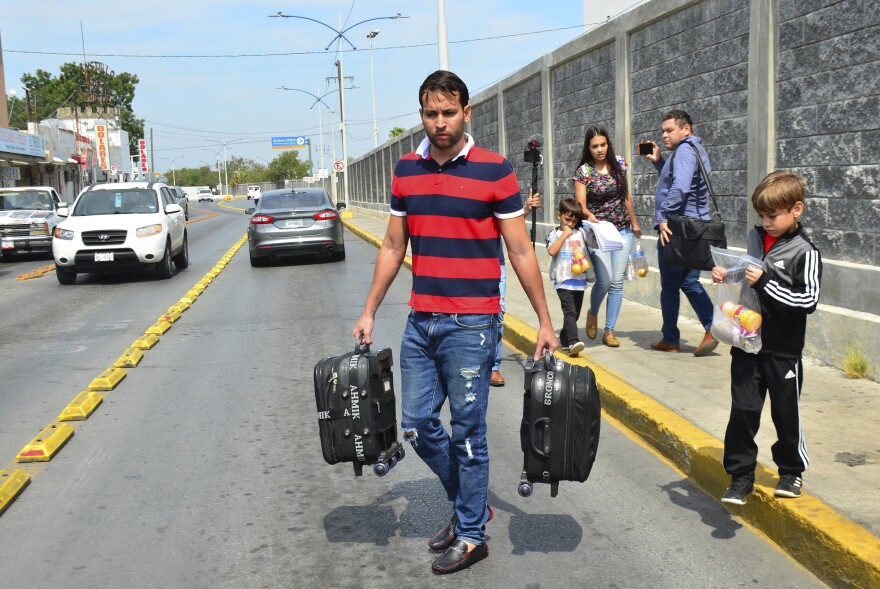The number of migrants taken into custody after crossing the U.S.-Mexico border dropped last month for this first time this year. About 104,000 migrants were taken into custody in June, down 28% from May, giving local shelters a small break from the overwhelming conditions just weeks ago.
Ruben Garcia runs Annunciation House, a migrant shelter in El Paso. He’s seen the decrease firsthand. Several weeks ago, he says, local shelters were receiving between 600 and 1,000 migrants per day. Now, they’re receiving between 75 and 100.
“Mexican government enforcement is now on steroids,” Garcia says. “Their enforcement now is very, very heavy and they are, as a result of that, preventing many Central Americans from reaching the border.”
He believes this heavy enforcement, combined with the summer heat and “Remain in Mexico” program, has led a significant drop in numbers. Annunciation House had been renting out hotel rooms and housing families at churches, but has since closed those sites, he adds.
Garcia also points to another factor he suspects is behind the drop: hesitancy from smugglers.
“All of these unknowns that are now being factored in are causing smugglers to simply stand down,” he says. “They’re just, ‘We’re not gonna try to move people until we see how this thing plays out.’”
Volunteers Now Concerned About Families Staying In Juárez
Though some pressure has been taken off El Paso shelters and churches to house large numbers of families, volunteers worry a humanitarian crisis has simply been shifted to Juárez, where thousands of migrants are waiting for court dates.
Local community members who mobilized to assist asylum seekers – by preparing and serving meals at shelters, or dropping off items like blankets and toiletries – now face a significant barrier to offering care: long, unpredictable wait times at the international bridges.
“Our concern transcends the border,” says Dr. Lisa Ayoub-Rodriguez, an El Paso pediatrician who has been treating hospitalized migrant children.
At a recent press conference, she spoke flanked by other pediatricians – some of whom volunteer at local shelters.
“We are doctors of all kids, and regardless of where they happen to be currently, what physical location they’re in, their health is a concern to use regardless of where they are," she said.
One physician noted that many of the volunteer pediatricians are not licensed to practice medicine in Juárez.
“I think we just don’t have the resources or the know-how or the connections to try and take care of that population,” added Ayoub-Rodriguez.
DHS, Despite Downturn: “We are past the breaking point”
In its statement, DHS noted that despite the recent drop, apprehension numbers remain high. Around 688,000 migrants were taken into custody in the last six months – a 140% increase from the same period last year.
Numbers typically dip in the summer, as fewer migrants attempt the journey north in scorching, sometimes dangerous heat. Federal officials also credited the Mexican government with bolstering its own border security and preventing migrants from reaching the U.S. Mexico has sent National Guard members and federal police to patrol its borders.
“Since the administration reached a new agreement with Mexico, we’ve seen a substantial increase in the number of interdictions on the Mexican southern border,” DHS said in a statement.
The U.S. government has also expanded its Migrant Protection Protocols policy, also known as "Remain in Mexico," which requires asylum-seekers to wait in Mexico for their day in U.S. immigration court.
“Decreasing apprehension numbers will provide greater opportunities for the DHS to address capacity challenges for those in custody and speed the movement of unaccompanied children into Health and Human Services care,” the department said in its statement.
DHS recently came under fire after reports of unsafe and unsanitary conditions at several Border Patrol facilities, including a West Texas station holding migrant children. Last month, Congress passed a $4.6 million package to improve conditions at detention facilities.
“We are still in an ongoing border security and humanitarian crisis,” the department said in its statement. “We are past the breaking point and in a full-blown emergency. This situation should not be acceptable to any of us."






